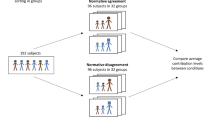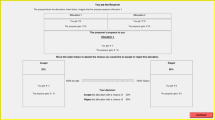Abstract
In public goods experiments, stochastic choice, censoring and motivational heterogeneity give scope for disagreement over the extent of unselfishness, and whether it is reciprocal or altruistic. We show that these problems can be addressed econometrically, by estimating a finite mixture model to isolate types, incorporating double censoring and a tremble term. Most subjects act selfishly, but a substantial proportion are reciprocal with altruism playing only a marginal role. Isolating reciprocators enables a test of Sugden’s model of voluntary contributions. We estimate that reciprocators display a self-serving bias relative to the model.
Similar content being viewed by others
References
Andreoni J. (1988). Why free-ride? Strategies and learning in public goods experiments. Journal of Public Economics 37, 291–304
Andreoni J. (1995). Cooperation in public-goods experiments - kindness or confusion?. American Economic Review 85, 891–904
Bardsley N. (2000). Control without deception: individual behaviour in free-riding experiments revisited. Experimental Economics 3, 215–240
Brandts J., Schram A. (2001). Cooperation and noise in public good experiments: applying the contribution function approach. Journal of Public Economics 79, 399–427
Camerer C.F. (2003). Behavioral Game Theory. Princeton, NJ, Princeton University Press
Cleveland W.S. (1979). Robust locally weighted regression and smoothing scatterplots. Journal of the American Statistical Association 74, 829–836
Costa-Gomes M., Crawford V.P., Broseta B. (2001). Cognition and behaviour in normal form games: an experimental study. Econometrica 69(5):1193–1235
Croson, R.T.A. (1999), Contributions to public goods: altruism or reciprocity? Working Paper #96-08-01, University of Pennsylvania.
Davis D.D., Holt C.A. (1993) Experimental Economics. Princeton, NJ, Princeton University Press
Fehr E., Gächter S. (2000). Cooperation and punishment in public good experiments. American Economic Review 90(4):980–94
Ferraro P.J., Rondeau D., Poe G.L. (2003). Detecting other-regarding behavior with virtual players. Journal of Economic Behavior and Organization 55, 99–109
Fischbacher U., Gächter S., Fehr E. (2001). Are people conditionally cooperative? Evidence from a public goods experiment. Economics Letters 71, 397–404
Goeree J.K., Holt C.A., Laurie S.K. (2002). Private costs and public benefits: unraveling the effects of altruism and noisy behaviour. Journal of Public Economics 83, 255–276
Houser D., Kurzban R. (2002). Revisiting kindness and confusion in public goods experiments. American Economic Review 92, 1062–1069
Isaac R.M., Walker J.M. (1998). Nash as an organising principle in the voluntary provision of public goods: experimental evidence. Experimental Economics 1, 191–206
Kurzban R., Houser D. (2001). Individual differences in cooperation in a circular public goods game. European Journal of Personality 15, 37–52
Ledyard J.O. (1995). Public goods: a survey of experimental research. In: Roth A., Kagel J. (eds) The Handbook of Experimental Economics. Princeton University Press, Princeton, pp 111–181
Lindsay B. (1983). The geometry of mixture likelihoods. Annals of Statistics 11, 86–94
Loomes G., Moffatt P.G., Sugden R. (2002). A microeconometric test of alternative stochastic theories of risky choice. Journal of Risk and Uncertainty 24, 103–130
McLachlan G., Peel D. (2000). Finite Mixture Models. New York, Wiley
Moffatt P.G., Peters S.A. (2001). Testing for the presence of a tremble in economic experiments. Experimental Economics 4, 221–228
Morgan J., Sefton M. (2000). Funding public goods with lotteries. Review of Economic Studies 67, 785–810
Nelson F.D. (1976). On a general computer algorithm for the analysis of models with limited dependent variables. Annals of Economic and Social Measurement 5, 493–509
Palfrey T.R., Prisbrey J.E. (1997) Anomalous behaviour in public goods experiments: how much and why?. American Economic Review 87, 829–846
Rabin M. (1993). Incorporating fairness into game theory and economics. American Economic Review 83, 1281–1302
Sefton M., Steinberg R. (1996). Reward structures in public goods experiments. Journal of Public Economics 61, 263–287
Sugden R. (1984). Reciprocity: the supply of public goods through voluntary contributions. Economic Journal 94, 772–87
Weimann J. (1994). Individual behaviour in a free-riding experiment. Journal of Public Economics 54, 185–200
Willinger M., Ziegelmeyer A. (2001) Strength of the social dilemma in a public goods experiment: an exploration of the error hypothesis. Experimental Economics 4(2):131–44
Author information
Authors and Affiliations
Corresponding author
Rights and permissions
About this article
Cite this article
Bardsley, N., Moffatt, P.G. The Experimetrics of Public Goods: Inferring Motivations from Contributions. Theor Decis 62, 161–193 (2007). https://doi.org/10.1007/s11238-006-9013-3
Accepted:
Published:
Issue Date:
DOI: https://doi.org/10.1007/s11238-006-9013-3




